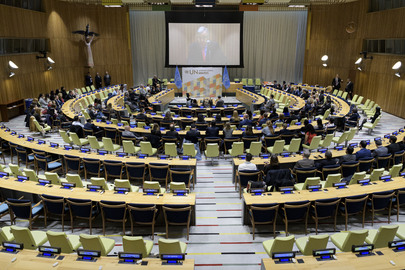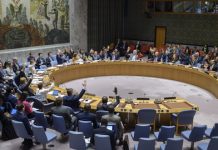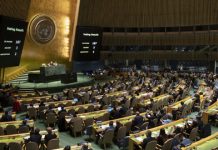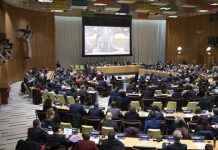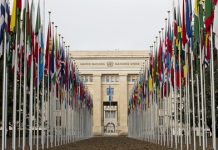Lisa Doughten was addressing Ambassadors at a Council briefing on preventing and responding to attacks against humanitarian and UN personnel, in line with resolution 2730 (2024), adopted in May.
“As we look to the next steps on resolution 2730, we urge this Council to champion action that protects humanitarian and UN personnel; ensures accountability for those who harm them; and helps survivors and families to rebuild their lives,” she said.
Gaza conflict drives surge
To date, 282 aid workers have been killed this year in places such as Gaza and Sudan, according to Humanitarian Outcomes, the independent research group that maintains a database of all major incidents stretching back to the 1990s.
Other colleagues have been injured, kidnapped, attacked and arbitrarily detained, and most victims are overwhelmingly local staff.
Ms. Doughten said much of the unprecedented surge in casualties is due to the situation in Gaza. Since the war began last October, more than 330 humanitarian workers have lost their lives, mostly staff with the UN agency that assists Palestine refugees, UNRWA.
“These numbers signal a disturbing lack of regard for the lives of civilians and humanitarian and UN workers. There is no situation in recent history that compares,” she said.
“So, as we gather today, seeking specific actions that the Security Council and the wider UN membership could take to increase the protection of aid workers, my first message is this: Please help protect my colleagues in Gaza.”
Call for protection
Despite the very real dangers, humanitarian and UN personnel continue to stay and deliver, and have provided life-saving support to more than 116 million people worldwide this year.
They must be protected, Ms. Doughten stressed.
While welcoming resolution 2730, she highlighted the critical need for the Council to clearly condemn attacks against aid workers.
“Our partners want to see renewed, unequivocal political support from the Security Council and Member States for aid workers and their safety,” she said.
“They want you to use diplomatic and economic pressure to force respect for international law. They demand, as does the Secretary-General, an end to arms transfers to anyone violating international law.”
Accountability for crimes
UN partners are also concerned by the lack of accountability for perpetrators of crimes against humanitarian workers, and how this emboldens further offences.
“They want to see more systematic and universal accountability for serious violations,” she continued. “They want Member States to fight impunity with political will and action, including through legislation that ensures accountability for crimes against humanitarian workers – both international and domestic.”
Aid partners also want the Council to do more to ensure accountability, she added. This includes encouraging international cooperation to facilitate investigations and prosecutions, and where national jurisdictions fail, to establish international mechanisms or refer matters to the International Criminal Court (ICC).
The final area for action concerns supporting humanitarians who have suffered harm. Measures include allowing survivors to directly participate in global discussions, including at the Council, as well as reparations and legal aid.
Take action now
The head of the UN Department for Safety and Security (UNDSS), Gilles Michaud, stated that resolution 2730 has never been more vital.
He reported that today, UN field operations face greater complexity, greater needs in more high-risk areas and threats to UN and aid personnel, including from State actors.
“Let me be clear. My biggest concern is a profound lack of accountability for violence against humanitarians and UN personnel. And this is where, now more than ever, we need you to take action,” he told ambassadors.
Mr. Michaud noted that host countries and UN Member States hold primary responsibility for the safety and security of the Organization’s personnel and the protection of its premises.
He urged all States to join the Convention on the Safety of UN and Associated Personnel and its Optional Protocol, and fully implement them.
Targeted and collateral violence
Abby Stoddard is a partner and director at Humanitarian Outcomes, which compiles the Aid Worker Security Database.
She said 30 years ago, fatal attacks on aid workers were not common.
Back then, the main threats they faced were accidents and illnesses, but “today, it is violence – both collateral and targeted – which claims more aid worker lives than any other work-related cause.”
She noted that 2023 was the deadliest year ever recorded, with 280 fatalities, but 2024 has already exceeded that “awful total”.
Ms. Stoddard echoed the calls made for greater protection and accountability.
Source of original article: United Nations (news.un.org). Photo credit: UN. The content of this article does not necessarily reflect the views or opinion of Global Diaspora News (www.globaldiasporanews.com).
To submit your press release: (https://www.globaldiasporanews.com/pr).
To advertise on Global Diaspora News: (www.globaldiasporanews.com/ads).
Sign up to Global Diaspora News newsletter (https://www.globaldiasporanews.com/newsletter/) to start receiving updates and opportunities directly in your email inbox for free.


